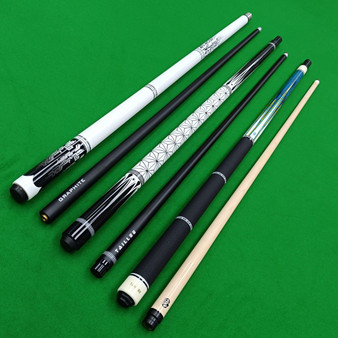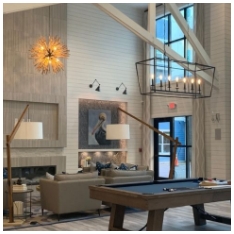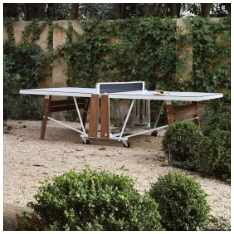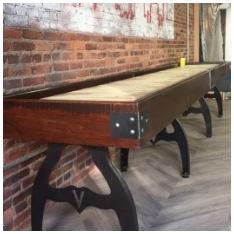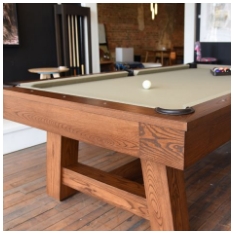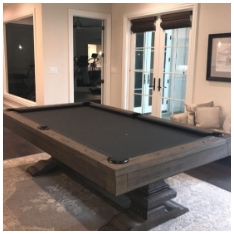When it comes to billiards, the right pool cue can make all the difference. Whether you are a casual player who enjoys friendly games or a professional aiming for competitive success, choosing the right cue affects accuracy, control, and consistency. This guide explores the best pool cues for average and professional players, covering materials, construction, and the features that matter most.
Why the Right Pool Cue Matters
Pool may seem like a simple game of striking balls into pockets, but precision and control come from practice and equipment. A well-made cue improves grip, balance, and shot-making ability. While a beginner might not notice small details, even average players benefit from better cues, and professionals rely on them to compete at the highest level.
Performance Benefits of a Good Cue
- Accuracy: A straight, well-balanced cue minimizes miscues.
- Consistency: Reliable feedback allows players to repeat successful shots.
- Comfort: A cue that matches your height, grip, and style prevents fatigue.
- Confidence: Using the right equipment builds trust in your game.
Key Factors to Consider When Choosing a Pool Cue
Before diving into recommendations, it’s important to understand the factors that distinguish one cue from another.
1. Cue Material
- Maple Wood: The most common and traditional material, offering durability and a smooth feel.
- Ash Wood: Recognized for visible grain patterns and a slightly stiffer hit.
- Composite or Fiberglass: Often used for durability and resistance to warping, suitable for beginners.
- Carbon Fiber: Lightweight and advanced, giving professionals consistency and precision.
2. Weight and Balance
Pool cues usually weigh between 18 and 21 ounces. Lighter cues promote finesse and ball control, while heavier cues add power to breaks and long shots. Balance also plays a role—center-balanced cues feel different from forward-weighted models.
3. Shaft Diameter
- Standard Shafts (13mm): Widely used and versatile.
- Slim Shafts (11–12mm): Favored by advanced players for better spin and cue ball control.
4. Cue Tip
Tips range from soft to hard.
- Soft Tips: Provide spin and grip but wear out faster.
- Medium Tips: Offer a balance between control and durability.
- Hard Tips: Deliver power and last longer but reduce spin potential.
5. Joint Construction
The joint connects the butt and shaft. High-quality joints—wood-to-wood, stainless steel, or quick-release—affect feedback and stability.
The Best Pool Cues for Average Players
Average players typically have some experience but are still improving consistency. They need cues that balance affordability with performance.
Affordable Yet Reliable Options
- Players Classic Maple Cue – A durable cue made of maple, perfect for improving basics without breaking the bank.
- Viper Commercial/House Cue – A great choice for recreational players seeking reliability at home or in bars.
- McDermott G-Series Beginner Models – Well-crafted cues offering better feedback and balance, helping players transition into more advanced play.
Features Average Players Should Focus On
- Choose a medium-weight cue (19 oz is a standard starting point).
- Look for a medium-hard tip to balance spin and control.
- Prioritize durability if the cue will be used in different playing conditions.
The Best Pool Cues for Professional Players
Professional players demand higher performance. Their cues must offer superior control, advanced construction, and the ability to adapt to different game formats.
High-Performance Picks
- Predator Revo Carbon Fiber Cues – Known for consistency, low deflection shafts, and durability, making them a favorite among professionals.
- Meucci Cues – Popular for their soft hit and precision, ideal for players focusing on finesse.
- McDermott G-Series High-End Models – Crafted with intricate inlays and advanced shaft technology for serious players.
- Lucasi Hybrid Cues – Offer a blend of performance and comfort, with vibration-dampening features for smoother play.
Features Professionals Value
- Low-deflection shafts for accurate spin shots.
- Custom weight systems for adjusting balance.
- Slimmer shafts for precise cue ball movement.
- Premium tips like Kamui or Moori for control.
Caring for Your Pool Cue
No matter which cue you choose, proper care extends its life and maintains performance.
Maintenance Tips
- Keep it straight: Store cues vertically or in a case to avoid warping.
- Clean the shaft regularly: Wipe with a cue cloth to remove chalk residue.
- Replace tips as needed: Worn tips reduce control and accuracy.
- Avoid extreme temperatures: Heat or moisture can damage wood and warp cues.
How to Choose the Right Cue for You
When deciding, ask yourself:
- What’s my playing level? Beginners need durability, while professionals need precision.
- What’s my budget? Affordable cues can still provide quality for average players.
- What’s my play style? If you rely on power, a heavier cue may help. If you play with finesse, a lighter cue and slim shaft are better.
Final Thoughts
Finding the best pool cues for average and professional players requires understanding balance, materials, and features. Average players should focus on affordable, durable cues that help refine their skills, while professionals benefit from precision-engineered equipment designed for control and consistency.
By choosing the right cue, maintaining it properly, and matching it to your play style, you can enhance both your enjoyment of the game and your performance on the table.
